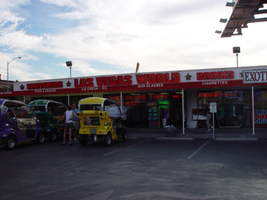Search the Special Collections and Archives Portal
Search Results
Shade Tree Shelter Records
Identifier
Abstract
The Shade Tree Shelter Records date from 1990 to 1996 and consist primarily of logbooks and journals compiled by the staff of the Shade Tree, a shelter for homeless and abused women and children in Las Vegas, Nevada, documenting daily activities, incidents, and residents at the shelter. The collection also includes summaries of the staff's telephone conversations, a newspaper article about Shade Tree, and fliers and brochures about social services available in Southern Nevada.
Archival Collection
Jackie Brett Collection on Las Vegas, Nevada Entertainment
Identifier
Abstract
The Jackie Brett Collection on Las Vegas, Nevada Entertainment (1977-1996) consists of writings by Jackie Brett and publications and clippings about Las Vegas, Nevada entertainment and tourism. Brett worked for the Nevada Commission on Tourism and promoted southern Nevada through her column "Brett's Vegas View." She wrote about production shows, concerts, special performances, and events as well as the overall development of Las Vegas tourist industry in the 1980s and 1990s.
Archival Collection
Robert Worts Photographs
Identifier
Abstract
The Robert Worts Photographs depict the Corn Creek Ranch in Nevada from 1936 to 1939. Located northwest of Las Vegas, Nevada, Corn Creek Ranch was home to writer George F. Worts in the late 1930s. Materials in the collection include photographs of Worts, buildings on Corn Creek Ranch, and a camp on Mount Charleston.
Archival Collection
Credit Professionals of Las Vegas Records
Identifier
Abstract
The Credit Professionals of Las Vegas Records (1941-1999) include information about the organization and its two predecessors, the Credit Women's Club of Las Vegas, Nevada and the Credit Women's Breakfast Club of Las Vegas, Nevada. The collection includes scrapbooks, procedure manuals from the local and international division of the organization, awards received by the local division, and regional and local newsletters.
Archival Collection
Union Plaza Photograph Collection
Identifier
Abstract
The Union Plaza Photograph Collection, approximately 1970 to 1971, consists of photographic prints and negatives taken during the construction of the Union Plaza Hotel and Casino in downtown Las Vegas, Nevada. Images portray the construction process, the surrounding area and businesses, and the completed project.
Archival Collection
Alan Cummings Research Files
Identifier
Abstract
The Alan Cummings Research Files (1974-2004) are comprised of research files compiled by Cummings, an elementary school teacher for the Clark County School District (CCSD) in Southern Nevada. The files represent Cummings's work to persuade the Teacher's Health Trust, the employee benefit plan for the school district, to consider domestic partnership benefits for CCSD educators and administrators. Materials include personal correspondence, newspaper clippings, magazines, and court cases.
Archival Collection
Verna Mortensen Photograph Collection
Identifier
Abstract
The Verna Mortensen Photograph Collection (approximately 1960-1679) is comprised of eight photographic prints that depict Fremont Street in Las Vegas, Nevada and ferries on the Colorado River in Nevada.
Archival Collection

Daniel A. Moore interview, March 3, 1979: transcript
Date
Archival Collection
Description
On March 3, 1979, Norwood Germany Jr. interviewed Daniel A. Moore (b. 1939 in Fort Worth, Texas) about his life in Las Vegas, Nevada. Moore begins by speaking about his move to Las Vegas from Utah at a young age, his education and his work in construction and at the Las Vegas McCarran Airport. Moreover, Moore speaks about his involvement with church and his recreational hobbies such as bowling. Moore also spends time speaking about the African American population in Las Vegas, the jobs available to them, racial tensions in his young adulthood versus his children’s experiences, and the segregation of black communities into the Las Vegas Westside. Lastly, he talks about the city’s growth, tourism and the economy, the development of different shopping centers and malls, and the city’s law enforcement.
Text

Miguel Villarba oral history interview: transcript
Date
Archival Collection
Description
Oral history interview with Miguel Villarba conducted by David Islas on December 6, 2021 for Reflections: The Las Vegas Asian American and Pacific Islander Oral History Project. In this interview, Miguel Villarba shares his family's history growing up in Manila, Philippines and immigrating to the United States in 2016. He talks about first living in Chattanooga, Tennessee before moving to Las Vegas, Nevada to be near family when Miguel was in high school. Miguel Villarba shares stories of his grandfather's farm in Pangasinan, Philippines, the differences in city and town life across Manila, Chattanooga, and Las Vegas, and his educational plans. He also talks about Filipino culture and traditions, and racial discrimination.
Text

Photographs of Las Vegas World Souvenirs signs, Las Vegas (Nev.), 2002
Date
Archival Collection
Description
Site address: 3710 S Las Vegas Blvd
Sign owner: property leased from MGM Mirage
Sign details: Located in the same lowrise building which the Las Vegas Helicopter Tours is located. See Las Vegas Helicopter Tours.
Sign condition: Structure 5 Surface 5 Lighting 5 All of the lighting, surface, and structure seem to be intact, and in good repair. The signage appears fairly new, and less worn.
Sign form: Fascia
Sign-specific description: The Las Vegas World Souvenir shop and market, boasts a collection of signage, almost completely crafted out of channel letters. The basic design is an entablature created on the wall above a pedestrian's head. The entablature runs along the south, east, and north faces of the building. The design is essentially channel letter words separated by channel designed stars. On the south wall the sequence reads, "star shape, 'drinks,' star, 'souvenirs,' star then 'market'." The interior of the star shapes are lined along the contours with yellow neon. The all caps lettering has red neon tubing on the interior. The sequence on the east side of the building reads from left to right, " star shape, 'Souvenirs,' star shape, 'Las Vegas World,' star shape, 'drinks,' then another star shape." The words "souvenir" and "drinks" are spelled in the same text and size as the south side, while the phrase "Las Vegas World" is larger fulfilling most of the height of the entablature. The north side of the building is similar to that on the south. This side reads , "Souvenirs, star shape, 'Market,' star shape, 'Film,' and another star shape." On the wall below the pediment closed face channel letters spell two phrases. The black channel letters are faced with red translucent faces. The first phrase reads , "Daily Grand Canyon Flights," in all caps. The second reads "Nightly strip rides in all capitals.
Sign - type of display: Neon; Incandescent
Sign - media: Steel; Plastic
Sign animation: Chasing
Sign manufacturer: Sign Systems, Inc
Sign - date of installation: 1996
Sign - thematic influences: There is no real present theme evident in the appearance other than the Emblem of the American flag crafted in neon on the front of the building. The incandescent bulb lined raceways and bulb filled channel letters, placed within a pediment hanging above the pedestrians head, posses a theme in a sense. It is a common occurrence to see such a combination of lighting among the strip to designate an establishment so its theme cold be considered to be that of Las Vegas. It's artistic significance can only be linked to such a trait. It is one of the most unique properties considering its function. Yes there are many facilities which offer tours but, this is the only one which provides helicopter tours that the pedestrian may watch take off. It is also one of the only establishments where the American flag is represented on the exterior in neon. It is also one of the only establishments where the incandescent bulb lined raceway is shaped into arrows. An interesting use of the most common adornment of exterior surveyed signage.
Surveyor: Joshua Cannaday
Survey - date completed: 2002
Sign keywords: Chasing; Fascia; Neon; Incandescent; Steel; Plastic
Mixed Content
